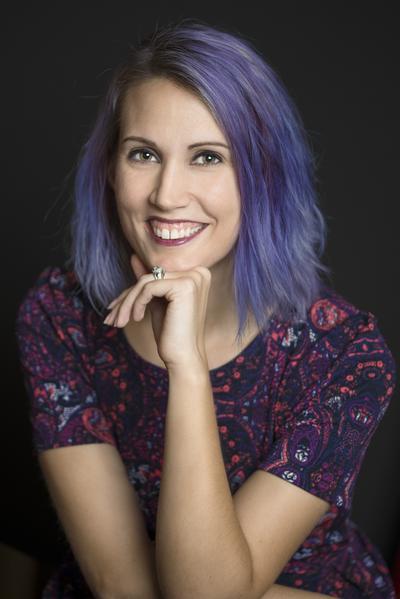Houston designer creates one-of-a-kind wedding gowns with skills learned from Purdue
Written by: Rebecca Hoffa, rhoffa@purdue.edu

Natalie Harris, owner and creative director of Renegade Bridal and New Heritage BridalRenegade Bridal
While many retail stores have several iterations of the same gown, creative director Natalie Harris’ bridal gowns are unlike standard dresses on the market. An alumna of Purdue University’s College of Health and Human Sciences, Harris adds embellishment, color, patterns and unusual details to each gown she designs, so brides can stand out on their wedding day in their dream dress.
Harris offers two bridal collections in her downtown Houston studio: New Heritage, which offers one-on-one collaboration with brides to create bespoke bridal gowns tailored to them, and Renegade, which is a collection of statement bridal gowns that incorporate color and prints to match the bride’s personality.
“It’s been work to get here,” Harris said. “You have to wear so many hats when you’re starting off as a solopreneur, and figuring out what it is you even want to be doing is a self-discovery struggle.”
Coming from rural Carroll County, Indiana, Harris always had a passion for art and fashion, but she didn’t imagine it as her career path until she attended the Purdue Fashion Show with her mother when she was a junior in high school, and she became hooked on Purdue’s apparel design and technology program.
“For a small-town girl to consider fashion design and then to see that this is absolutely a valid career direction, I was sold,” Harris said.
Harris always had a practical mindset when approaching her career in fashion. She knew she did not want to end up in New York or Los Angeles, and she created plenty of options within her portfolio as a senior at Purdue to ensure she would have options upon graduating.
“I actually overachieved, and I did two senior collections,” Harris said. “I did a co-ed sportswear collection, and I did bridal, figuring wherever I decide to go, people are going to wear sportswear, and people are going to be getting married.”
When she graduated from Purdue, she started working customer service for a bridal gown manufacturer in Houston. She then moved from that role into bridal retail as a stylist. There, she discovered her passion for collaborating with brides to build their vision.
However, Harris quickly noticed many of the dresses followed a similar style or design that didn’t always match the unique tastes of each bride.

Harris adds embellishment, color, patterns and unusual details to each gown she designs, so brides can stand out on their wedding day in their dream dress.Renegade Bridal
“When you begin a consultation with a bride as a stylist in one of these retail stores, you always start off with, ‘What is it you’re looking for?’” Harris explained. “I swear like 80 percent of people answer that they want something different. Some of them just meant ‘not strapless,’ and that’s their tolerance for ‘different,’ but there was a good chunk who meant legitimately different than the thousand dresses I had hanging behind me. They wanted statement, memorable dresses. That, partnered with my craving for experimentation and tinkering, turned into my first iteration of doing custom design with local brides.”
Harris credits much of her success in developing her own bridal studio to her well-rounded education at Purdue, giving her an advantage over designers who go to a school focused solely on art and design.
“A lot of designers graduate from art and design schools knowing how to make a couture gown really well, but they don’t know how to work with luxury clients — they don’t know how to work with brides at all,” Harris said. “They don’t understand how to sell their product, build a website, advertise, market themselves, build a brand and have all of these pieces work together. I absolutely credit Purdue’s breadth.”
While Harris said there are many rewarding parts of her job, sewing and pattern-making are not her niche. While she struggled through her start-up fashion business for the first few years, she now has a full staff of vendors lined up to help her business thrive, and she is able to focus on the big-picture conceptualization and ideation.
“I think one of my favorite things is when I meet somebody for the first time, and they see 12 of my gowns that I feel are going to strongly communicate what we’re about, and we chat for a few minutes, and by the end, we’re usually hugging or squealing or both, excited about being on each other’s wavelength,” Harris said. “That’s the part that keeps me going.”
Harris’ advice for current Purdue students is to be strategic with their electives and take accounting and marketing courses that are valuable in the fashion industry as they learn to conceptualize and apply their vision to a brand. In addition to that, she said it is important that students understand all their options in the fashion world, outside of the fantasy that shows like “Project Runway” have romanticized.
“There’s been a lot of misinformation about what it takes and all the different directions you can go,” Harris said. “I would encourage people to seek out information about the kinds of jobs that really exist. Technical design is a thing. Just being a branding specialist is a thing or being a trend forecaster.”